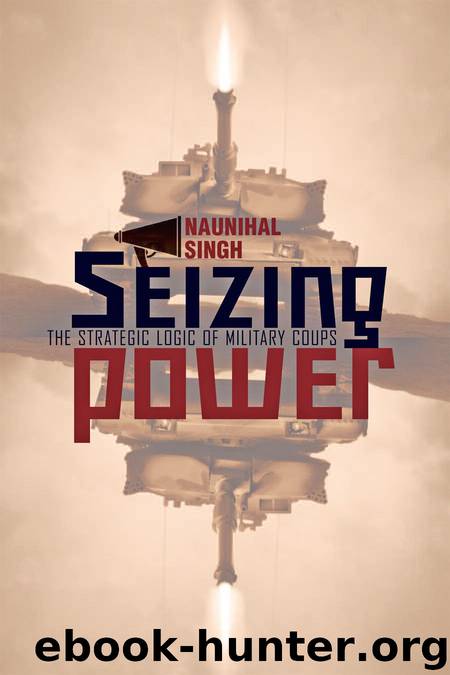Seizing Power by Naunihal Singh

Author:Naunihal Singh [Singh, Naunihal]
Language: eng
Format: epub
Publisher: Johns Hopkins University Press
Published: 2014-06-12T00:00:00+00:00
Conspiracy
Prospective mutineers are handicapped at each step of their attempt to seize power, starting with their limited ability to conspire. Open discussion of politics in the mess hall or barracks is against the norms of most militaries, and it is not possible for large numbers of soldiers or junior officers to meet for explicitly political purposes without attracting attention. To get around such prohibitions, men will sound each other out privately, in small groups, or during social events such as birthdays, weddings, or christenings where peers might legitimately gather.
Because coups from the bottom often claim legitimacy from mass discontent with the status quo, mutinies are often explained using the metaphor of elections. Such explanations, however, give too much importance to the nature and intensity of the grievances motivating the mutiny and too little to the collective action dynamics involved. Widespread unhappiness with the government is not a sufficient condition for a coup from the bottom to succeed. Even when a majority of soldiers would wish to see the government overthrown, those soldiers will be unwilling to join a mutiny unless they believe that many others will also do so and the coup will therefore succeed.
Civilians will generally play a smaller role in the organization of coups from the bottom than other kinds of coup attempts. The grievances at the heart of a coup from the bottom often have as much to do with military politics as civilian politics, and the mutiny may be framed as a response to a morally bankrupt civilian order. This gap between the civilian and military world can be bridged under special circumstances, such as if a coup plot is embedded in a larger revolutionary conspiracy (especially a Marxist one) uniting both sides under a common ideology. Other times, a civilian revolution either inspires a mutiny or is inspired by one, in which case there will be linkages between leaders but no direct civilian involvement in the mutiny. In this way, mutinies formed an important part of both the February Revolution in Russia 1917 and the Iranian Revolution of 1979. Lastly, civilians who are ex-military officers sometimes return to lead coups that involve their former peers.
Download
This site does not store any files on its server. We only index and link to content provided by other sites. Please contact the content providers to delete copyright contents if any and email us, we'll remove relevant links or contents immediately.
| Arms Control | Diplomacy |
| Security | Trades & Tariffs |
| Treaties | African |
| Asian | Australian & Oceanian |
| Canadian | Caribbean & Latin American |
| European | Middle Eastern |
| Russian & Former Soviet Union |
The Secret History by Donna Tartt(19089)
The Social Justice Warrior Handbook by Lisa De Pasquale(12190)
Thirteen Reasons Why by Jay Asher(8910)
This Is How You Lose Her by Junot Diaz(6887)
Weapons of Math Destruction by Cathy O'Neil(6280)
Zero to One by Peter Thiel(5802)
Beartown by Fredrik Backman(5754)
The Myth of the Strong Leader by Archie Brown(5508)
The Fire Next Time by James Baldwin(5446)
How Democracies Die by Steven Levitsky & Daniel Ziblatt(5219)
Promise Me, Dad by Joe Biden(5153)
Stone's Rules by Roger Stone(5088)
A Higher Loyalty: Truth, Lies, and Leadership by James Comey(4964)
100 Deadly Skills by Clint Emerson(4925)
Rise and Kill First by Ronen Bergman(4789)
Secrecy World by Jake Bernstein(4753)
The David Icke Guide to the Global Conspiracy (and how to end it) by David Icke(4720)
The Farm by Tom Rob Smith(4513)
The Doomsday Machine by Daniel Ellsberg(4490)
